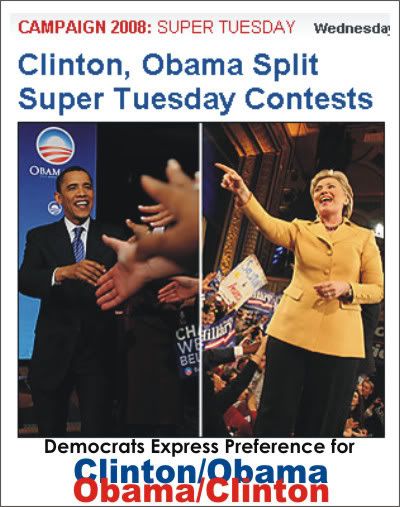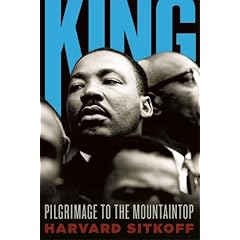If Hillary decides she needs a black running mate to make up for the wounded feelings of the campaign, there’s a better option for her than Obama himself. Aside from pie-in-the-sky talk of appealing to General Colin Powell to cross party lines to join a Clinton ticket (a nightmare for Republicans, obviously), there’s another selection that would also play in to a possible Southern strategy. Former Congressman Harold Ford Jr. now heads the DLC (Democratic Leadership Council), the same moderate, centrist group that Bill Clinton himself (and Joe Lieberman) once led. He’s an outspoken Christian who ran surprisingly well among white evangelicals in his close 2006 Senate race in Tennessee. He’s also even younger (he’ll be 38 in May) and better-looking than Obama, with the same sort of suave presentation and blue-chip academic credentials (University of Pennsylvania, and University of Michigan Law School). During his five-terms in the House of Representatives he compiled a conspicuously moderate record (supporting limitations on abortion, backing a stronger military and the war on terror) that could help Clinton run to the middle.
Best of all, Congressman Ford would steal from Obama the distinction of the first African-American on a national ticket and, if Clinton wins election, he could run as her loyal successor and block Obama in 2016 (Ford would only be 46 –younger than Obama is now).
But even if Senator Clinton ignored all these possibilities and considerations and decided to offer Senator Obama a place on the ticket, he’d find powerful reasons to turn her down.
Why He’d Turn down the Vice Presidency
Moreover, there’s always the possibility that a Clinton-Obama pairing loses in November – in which case his presence on the ticket would do him more damage than good. John Edwards’ campaign this year demonstrated the way that a failed race for the Vice Presidency gives little advantage in future campaigns.
In short, a Vice Presidential nomination offers Obama no substantive benefits while depriving him of some of his independence and freedom of maneuver.
He’d never again be able to run as plausibly as a candidate of “change” if he serves eight years as Hillary’s Veep. Inevitably, he would become a candidate associated with the infamous Clinton Machine, and tainted by all its corruptions and compromises. Obama knows history, and remembers the way that distinguished, powerful Senators of the past like Hubert Humphrey and Al Gore took the Vice Presidency and then found their own runs for the White House shadowed by the controversial legacies of their bosses (LBJ and Bill Clinton)
And worst of all for Barack, the magical aura of this campaign, with huge crowds intoxicated at the very idea of a black president, couldn’t be recaptured if he’s already run in the number two position. If we’ve already elected (or even nominated) an African-America as Vice President, the idea of a future Presidential race wouldn’t be nearly as novel or thrilling.
Why Not Obama-Clinton?
With all the potent reasons for Hillary to disregard the idea of running with Barack, and the even more decisive reasons for him to turn her down even if she offered, some Democrats love to consider the upside-down arrangement: why not an Obama-Clinton ticket?
If anything, this notion looks even less plausible.
Those who know Hillary report that she thoroughly enjoys her well-established role in the U.S. Senate. If she lost to Obama in the Presidential race, she’d greatly prefer to return to Capitol Hill—where she could probably serve for the rest of her life and stands an excellent chance of succeeding Harry Reid as Majority Leader.
As a prominent part of the previous Clinton administration, she witnessed first hand all the indignities and burdens thrust upon Vice President Al Gore—in fact, she administered some of them herself. Why would she want to open herself to the humiliation of waiting around in a powerless, second-string job in case some disaster befell a conspicuously young and vigorous president?
Hillary would also find it difficult to use the Vice Presidency as a stepping stone to a future Presidential run. She’d be 68 at the end of a second Obama term, and the generational shift his nomination signaled would make it most unlikely that Dems turn backward to a Baby Boomer restoration with an aging Hillary.
As for Obama, he wouldn’t need her and wouldn’t want her on his ticket. If he beats her in the fight for the nomination this year, he’d want to complete the Democratic disassociation from the nasty politics of the Clinton era. Barack’s insistence on “change” and a “fresh” approach signifies not only a departure from the age of Bush, but also closing the chapter on the age of Clintons. Hillary on the ticket inevitably brings Bill with her, as a third figure at the top of the party, and undermines the idea of a generational changing of the guard and the adoption of a new, more unifying tone.
Finally, no President wants the malevolent combination of Bill and Hill scheming against him from a new vantage point in the Vice President’s residence at the Naval Observatory.
If Obama feels that the bruises of the campaign require a female running mate he could find any number of preferable alternatives – particularly Governor Janet Napolitano of Arizona. She has the executive experience that both Obama and Clinton lack, as a former US Attorney, state Attorney General, and Democratic governor in a Republican state who won re-election by a nearly two-to-one margin. She’s also won a reputation as moderately tough on illegal immigration, and might even help Obama compete with John McCain in his home state. Best of all, Napolitano (or other Democratic governors like Kathleen Sebelius of Kansas, or Senators like Dianne Feinstein of California) come without the heavy baggage of the Clintons’ soap-opera marriage and reputation for political thuggery.
Concerning the much-discussed “dream ticket,” most observers concede that neither Obama nor Clinton want it. When you combine their joint reluctance with the fact that neither candidate would truly need the other in order to run effectively against the Republicans, the likelihood of the uncomfortable alliance becomes very remote indeed. More HERE






































![[npr_newsnotes.jpg]](https://blogger.googleusercontent.com/img/b/R29vZ2xl/AVvXsEjrutmUkZxwkFeBaRIQmhH5IjbSRus-kQEYwA_IbtQXARIcnJdZsw0tyuY63HLYZjQM-YtcE3niv6L_w73Bm9UQIrLrhurYZVxJP1HiHSpgUPM0xzBPZJIYjmSA06qU1uO9sjgFkTMkWjA/s1600/npr_newsnotes.jpg)



